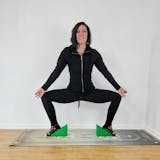
The ancient practice of yoga is more than just a series of exercises to improve flexibility; it is a deeply spiritual experience that reawakens the mind at the same time as soothing the body. Similar to meditation, practicing yoga can help people to enter an intensely focused state of mind which is alert but at the same time free from worries or stress. Regular practice of yoga not only exercises the muscles of the body, improving posture and core strength, but also leads to a greater awareness of how the body works and how it responds to the stresses of daily life. This bodily understanding can help the practitioner to manage and experience relief from physical symptoms that have a psychological trigger, while the physical movements can support the healing of physical injuries. Yoga also offers many mental health benefits and can support people recovering from eating disorders or mental illnesses.
 Physical Healing Through Yoga
Physical Healing Through Yoga As with any form of exercise, great care must be taken when doing yoga with an existing physical injury. Hatha yoga – a low-impact form of yoga involving stationery postures and deep breathing – is one of the best forms of exercise for injury sufferers due to its controlled pace and emphasis on correct alignment of the joints and muscles. Staying mobile during recovery from an injury helps to prevent muscles from stiffening up, but it is essential to follow the fundamental yogic principle of listening attentively to the body and not pushing beyond its limits. Yoga can help to reduce the pain of long-term physical conditions. A medical study published in 1998 found that people suffering from carpal tunnel syndrome were helped by adopting a twice-weekly yoga routine designed to balance and strengthen the upper body. Unlike conventional treatments that only focus on the wrists and hands, yoga works on the understanding that all the parts of the body and the mind are connected; therefore improving overall posture or teaching new patterns of movement in the arms and shoulders can relieve the pain in the wrists of carpal tunnel syndrome sufferers. The aim of the holistic yoga instructor is not simply to guide his or her students through a series of postures, but to give them a new way of using and relating to their bodies that will spill over into their daily lives. The yogi’s increased awareness of his or her body can help in the treatment or prevention of many physical injuries.
The Physio-Psychological Connection Many conditions that have distressing physical symptoms, such as irritable bowel syndrome, actually arise from a mental trigger. Our daily lives are filled with fears and worries and there never seems to be time to unwind. Setting aside a couple of hours a week to practice yoga means making time to look after your mental health. In vinyasa yoga, which is also known as flow yoga, postures are connected by smooth transitions to create a flowing sequence of movements that is repeated several times during each session. While the body is working, the mind can relax; troubling thoughts drain away while the awareness remains lightly focused on the physical movements and sensations arising in the body. Some people are able to experience great relief from their physical symptoms by developing this powerful combination of a strong body and a calm mind.
 Spiritual Healing and Recovery
Spiritual Healing and Recovery Recovering from a mental illness or eating disorder is tough, while slipping back into old patterns of self-destructive behavior is far too easy. Research published in the Journal of Adolescent Health concluded that yoga is a promising therapy for eating disorder recovery, while numerous studies have noted the anxiety-reducing benefits of regular yoga practice. Yoga is much gentler than other forms of exercise and therefore places less stress on a body that may be fragile as a result of self-destructive behavior, but it is the mental health benefits of the practice that really make it a valuable part of holistic healing. Yoga moves the mind’s focus away from unhealthy preoccupations and brings it back to the here and now, restoring great psychological power to the practitioner. Reclaiming such great mental strength can be extremely helpful in recovery from depression, anxiety or addiction.
References Marian S. Garfinkel et al, Yoga-Based Intervention for Carpal Tunnel Syndrome, JAMA, 1998, Vol 280, No. 18.
http://jama.jamanetwork.com/article.aspx?articleid=188150 T. Rain Carei et al, Randomized Controlled Clinical Trial of Yoga in the Treatment of Eating Disorders, Journal of Adolescent Health, 2010, Volume 46, Issue 4, Pages 346-351.
http://www.jahonline.org/article/S1054-139X(09)00334-6/ 






